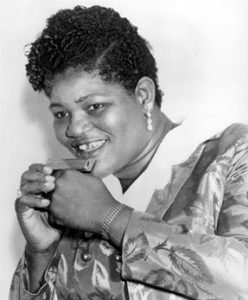J. B. Lenoir in Chicago
J. B. Lenoir
Sharp Dressed J. B.
J.B. Lenoir stars in the original 16mm footage with the original monaural optical soundtrack shot in Chicago by Steve and Ronnog Seaberg with Peter Amft in 1964.
The songs performed are: “I’ve Been Down For So Long,” “Everything I Do Is Wrong,” and “I Feel So Good.”
One of the earliest films of a Chicago blues musician, especially in color, showing what J. B. looked like when he appeared on stage and in clubs in either his gold, chartreuse, black or zebra striped tuxes or tailcoats, his gold colored electric guitar, harmonica and mic holder and a long cord so that he could move around the club floor. All of this as opposed to the image promoters wanted him to have with an acoustic guitar and unassuming clothes as seen in other film and video clips from this time. The idea was that he should appear as an unsophisticated folk-musician rather than the professional artist that he really was.
Lenoir’s guitar-playing father introduced him to the music of Blind Lemon Jefferson which became a major influence. During the early 1940s, Lenoir worked with blues artists Sonny Boy Williamson II and Elmore James in New Orleans, and would eventually find musical influence in Arthur Crudup and Lightnin’ Hopkins.
He moved to Chicago in 1949, where Big Bill Broonzy helped introduce him to the local blues community. Afterwards J. B. began to perform at local nightclubs with musicians such as Memphis Minnie, Big Maceo Merriweather, and Muddy Waters, and became an important part of the city’s blues scene. He began recording in 1951 the J.O.B. and Chess Records labels. His recording of “Korea Blues” was licensed to and released by Chess, as having been performed by ‘J. B. and his Bayou Boys’. His band included pianist Sunnyland Slim, guitarist Leroy Foster, and drummer Alfred Wallace.
J.B. recorded on various record labels in the Chicago area during the 1950s including J.O.B., Chess, Parrot, and Checker. In 1963, Lenoir recorded for USA Records as “J. B. Lenoir and his African Hunch Rhythm,” developing an interest in African percussion. However, he struggled to work as a professional musician and for a time took menial jobs, including working in the kitchen at the University of Illinois. Lenoir was rediscovered by Willie Dixon, who recorded him with drummer Fred Below on the albums Alabama Blues and Down In Mississippi (inspired by the Civil Rights and Free Speech movements). Lenoir toured Europe, and performed in 1965 with the American Folk Blues Festival in the United Kingdom. Lenoir’s work had direct political content relating to racism and the Vietnam War. He died on April 29, 1967 in Urbana, Illinois from a heart attack related to injuries he suffered in a car accident three weeks earlier. He was only 38.
Really The Blues is sponsored by Jazz on the Tube
Click here to Support US

